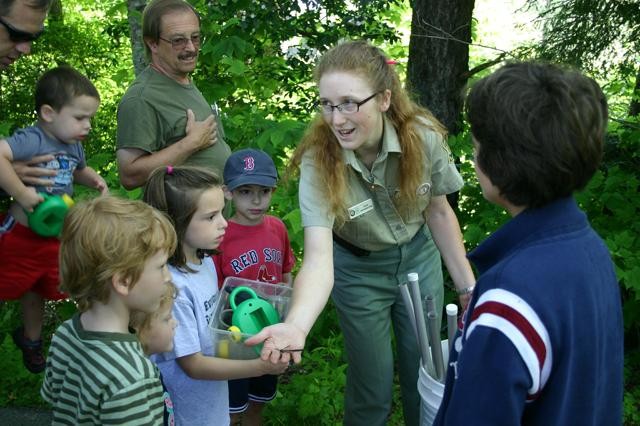Families trickle into the Cradle of Forestry for Bug Day, an annual celebration of all things insect. A full day of crafts and bug hunts await eager children and their parents at the event, which gives community members the chance to better know oft-misunderstood arthropods — especially the subgroup of species we call “bugs.”
“I really like insects. They get a bad reputation, but they’re really important for a multitude of reasons,” says Cradle of Forestry intern Alina Nuebel.
Children gather around Nuebel for the first event of Bug Day: a pond exploration. Armed with nets, the children listen closely to her. She lays out two rules: Try not to stir up too much muck when hunting pond insects and if you catch something, put your hand on the underside of the net to protect it. Immediately, the children scamper off to the muddy low-points of the pond. Their eyes show pure determination as they watch for insects — or anything that moves. Water scorpions, young dragonflies and polliwogs are among the kids’ bounty.
Whenever an insect is caught, the children dump it into water tubs Nuebel has provided for observation. Little fingers try to grasp the creatures and put them in plastic magnifiers to get a closer look. Then, they’re off again to discover the next creepy-crawly. When the hunt is over, the insects are released back to their homes in the pond.
About 30 children and adults have sacrificed their Saturday-morning cartoons to be here. “It’s a beautiful day and we’re here to have an adventure,” says parent Sara Coleman, who brought her family.
After the pond hunt, the children divide up and go on either a bug hike or guided tour. Participants learn about various insects and their roles in nature. “There is a full relationship between insects and the forest, and also the importance of conservancy of the insects,” says Education and Interpretation Manager Cindy Carpenter.
She explains that one such relationship is between plant galls and trees. Galls are outgrowths that appear on trees, acting as homes for tiny insects living in the center, says Carpenter. In that way, the tree becomes a living space. Participants observe parts of trees and leaves, looking for insect visitors. Armed with an identification book, Carpenter is quick to name the bugs they see. “There are over 1,000 insects associated just with oak trees,” she says.
Bug Day was first celebrated at the Cradle in 2002. Carpenter says the event helps people understand the benefits of different insect species. “They’re so diverse and so varied and have such interesting roles in the environment that it’s just very intriguing. It’s also important because many of the actions we take in our everyday lives can affect insects,” says Carpenter.
Pivotal pollinators
Bug Day is part of National Pollinator Week, held this year from June 17-23. It’s sponsored by the Pollinator Partnership, a nonprofit organization that aims to protect pollinators of various kinds, including honey bees and monarch butterflies.
Matt Elliot, owner of Pure Pisgah Honey, touched on the importance of honey bees, bringing to the event a live beehive and samples of the sweet goo. Children gather around the hive, fascinated by the number of bees working to create honey. He answers questions about how queens are chosen, what the worker bees do and even about what “dances” they use to communicate with one another.
“They help produce food for us, pollinate fruit trees, nuts and one-third of all the food we eat,” says Elliot.
Honey bees are just one of the many insects that help pollinate flowers, fruits and other plants. Unfortunately, some of these pollinators are facing rapidly declining populations, like the monarch butterfly.
Master Gardener and volunteer Joyce Pearsall set up a display dedicated to monarchs, complete with caterpillars and two adults. According to Pearsall, the creature’s migration is down 95 percent. She says out of 40-50 eggs laid, only 5 percent of a monarch’s babies will survive. The monarchs not only play an important role in pollination, they are also one of the few insects people aren’t as afraid of.
When asked if she likes bugs, 10-year-old Leah Weiss says, “I find them interesting. I don’t like that when you touch them, they’re icky.”
Nicolette Wehrli, an 11-year-old who also attended last year’s event agrees, saying, “I think they’re cool.”
But not everyone at Bug Day was thrilled. “I don’t like bugs,” says 11-year-old Trevor Dwyer. “Well, first of all, ants. They’re bugs and really annoy me.”
Harmful insects do exist, but the Food and Agriculture Organization says only 5,000 species out of 1 million are considered harmful. And while most insects have proven to be vital to our ecosystem, they still give a lot of people the creeps. Bug Day set out to change that, highlighting the importance of insects and attempting to bring about a more accepting attitude.
So, annoying or not, Carpenter reiterates the pivotal role these bugs play: “Even though they don’t have backbones, they support life.”
— Brandy Carl is an Xpress news intern and a senior at Western Carolina University. She can be reached at brandy@mountainx.com or 251-1333, ext. 128.



Before you comment
The comments section is here to provide a platform for civil dialogue on the issues we face together as a local community. Xpress is committed to offering this platform for all voices, but when the tone of the discussion gets nasty or strays off topic, we believe many people choose not to participate. Xpress editors are determined to moderate comments to ensure a constructive interchange is maintained. All comments judged not to be in keeping with the spirit of civil discourse will be removed and repeat violators will be banned. See here for our terms of service. Thank you for being part of this effort to promote respectful discussion.